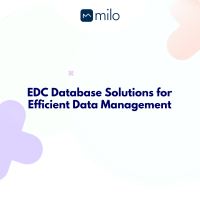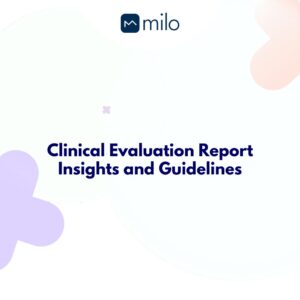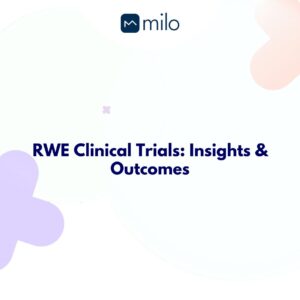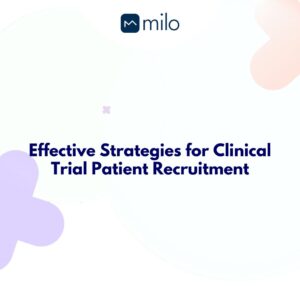At MILO, we are experts in advanced EDC database solutions. These are designed to make managing clinical trial data simpler. Our platform has everything needed for this task. It covers electronic patient-reported outcomes (ePRO), electronic consent (eConsent), and more.
We make sure the process of gathering, handling, and safely keeping data is smooth. This helps clinical researchers carry out their trials more effectively.
Key Takeaways
- MILO offers sophisticated EDC database solutions tailored for clinical trial data management.
- Our platform includes services like ePRO, eConsent, EDC, eCRF, eCOA, and RWE.
- Our solutions facilitate a seamless process for collecting, managing, and securely storing data.
- We support clinical researchers in conducting more efficient and precise trials.
- Our tools ensure enhanced efficiency and data integrity throughout the research process.
Introduction to EDC Systems
Electronic Data Capture (EDC) systems have changed clinical research a lot. They make it easy to manage data in every clinical trial. These systems are key for efficient data collection, organization, and analysis.
Using an EDC platform helps clinical researchers work better. It makes the results of their trials more reliable and accurate. These platforms handle data collection, validation, and real-time processing well.
EDC systems help manage lots of data in trials better. This means trials are more accurate and follow rules better. So, picking an EDC platform is a big choice that can make clinical trials much better.
Key Components of an EDC System
To grasp the power of an EDC system, we need to look at its key parts. Each part plays a big role in making the system work well. They handle everything from collecting data to keeping it safe.
Data Collection Processes
The heart of any EDC software is how it collects data. Our systems allow several ways to enter data, including:
- Manual entry via web-based forms for easy and user-friendly data submission.
- Automated collection from integrated devices to streamline real-time data acquisition.
- Bulk uploads for efficiently handling large datasets.
These methods make filling out electronic forms quicker and easier than old ways.
Data Organization & Storage
After collecting data, organizing and storing it correctly is key. We use the same type of databases to keep everything consistent and reliable. We also back up data regularly to make sure it’s safe and can be reached easily when needed. Here’s how:
| Component | Description |
|---|---|
| Standardized Databases | Ensures uniformity and reliability across all stored data. |
| Backup Procedures | Regular backups to ensure data recoverability and security. |
| Data Validation Tools | Used to verify the accuracy and integrity of stored data. |
Data Security & Protection
Security is key in EDC systems. Good security measures include:
- Encryption to protect data during transfer and storage.
- Authentication methods to verify user identity and stop unauthorized access.
- Activity logging to keep an eye on who accesses or changes data, ensuring everything is transparent and accountable.
By focusing on these security steps, our EDC software not only keeps data safe. It also meets industry rules, making sure the data is reliable and trustworthy.
Benefits of Using EDC Systems in Clinical Trials
Using an electronic data capture system (EDC) in clinical trials has great benefits. These systems help us get more accurate data quickly and safely.
Improved Data Accuracy
EDC systems make our data more accurate by getting rid of paper-based methods that often have mistakes. They automate data entry so that everything in the clinical trial database is correct and reliable. This reduces errors and inconsistencies.
Real-Time Data Validation
EDC systems can check data right as it’s entered, thanks to real-time data validation. They spot and fix problems fast, keeping the data clean and high-quality. This speeds up the process and improves our data.
Enhanced Data Security
In clinical trials, keeping patient information safe is top priority. EDC systems use strong security, like encryption and authentication, to prevent unauthorized access. They meet strict standards to keep our data safe and private.
| Benefit | Description |
|---|---|
| Improved Data Accuracy | Automates data entry, reducing human error and enhancing reliability. |
| Real-Time Data Validation | Permits immediate detection and correction of discrepancies, ensuring data integrity. |
| Enhanced Data Security | Utilizes encryption and authentication protocols to protect sensitive patient information. |
Integrating EDC with Other Clinical Technologies
In clinical research, it’s key to connect Electronic Data Capture (EDC) with other tech. This mix boosts how we handle data and smooths out the research steps. We’ll look at how it works with Electronic Health Records (EHRs), Clinical Trial Management Systems (CTMS), and Lab Information Management Systems (LIMS).
Integration with Electronic Health Records (EHRs)
Linking EDC and EHRs lets us share data smoothly and cuts down on duplicates. This way, clinical info is updated instantly, making records more precise and improving patient care. Plus, it streamlines work and makes research more accurate.
Integration with Clinical Trial Management Systems (CTMS)
Mixing EDC systems with CTMS is vital for better trial management. It gives a complete view of trials, offering fresh insights and helping coordinate all parts. This approach boosts how trials are run, improving data management and trial control.
Integration with Laboratory Information Management Systems (LIMS)
Combining LIMS with EDC is key for smooth lab data management. It makes sure lab results are quickly and correctly added to our database. This step improves data’s reliability and speeds up analysis, which is essential in clinical research.
| Integration Type | Benefits |
|---|---|
| Electronic Health Records Integration | Seamless data sharing, reduced redundancy, real-time data availability |
| Clinical Trial Management | Comprehensive trial oversight, real-time insights, enhanced coordination |
| Laboratory Information Management Systems | Streamlined data flow, improved accuracy, faster analysis |
Challenges in EDC System Implementation
Setting up an EDC platform has many hurdles. Each step needs thought to work through the problems. We will look at key areas that need focus for a good outcome.
Costs of Implementation
Starting with modern data software can cost a lot. It needs a big budget for the latest tech, setup, and upkeep. This can be hard on small groups, so planning your finances is key.
Data Security and Compliance
Keeping data safe and meeting strict rules is crucial with an EDC system. You need strong security steps like encryption and controlling access to protect info. Groups have to keep up with changing rules to stay compliant.
Compatibility Issues
Mixing an EDC system with old ones can cause issues. If data tools and old systems don’t match, it can make things tricky. Checking new and old tech for a good fit is critical.
Training and User Adoption
Teaching users and getting them to embrace the software is vital. They need to know how to use the EDC system well. Offering ongoing training and help is key to get everyone on board smoothly.
Choosing the Right EDC Database Software Solution
Choosing the right EDC database software takes careful thought. You need to look at your specific needs. Things like how well it works with other systems, if it can grow with you, if it meets legal rules, and if it’s easy to use are key. These points make sure the EDC software solution you pick works well for clinical trials.
At MILO, we focus on creating EDC solutions perfect for the complex world of clinical research. Our solutions fit easily into your work and can handle more data as needed. You won’t have to stress about following rules because we’ve got that covered.
We make our data validation tools top-notch. They make sure all the data you gather is spot-on and trustworthy. This step ups the quality of your study. Plus, our systems are easy to get the hang of, so you won’t need a lot of training to use them.
| Criteria | Importance | MILO’s Offering |
|---|---|---|
| Ease of Integration | High | Seamless integration with existing systems |
| Scalability | High | Flexible solutions to accommodate data growth |
| Regulatory Compliance | Critical | Strict adherence to industry regulations |
| User-Friendly Interface | Essential | Intuitive and easy to navigate |
| Data Validation Tools | Essential | Robust validation for data integrity |
We focus on what matters most to give our clients top-notch tools. Our advanced solutions make managing data a breeze. They’ll help you ace your clinical research game.
MILO’s EDC Database Solutions
At MILO, we’re all about leading with top EDC database solutions in digital innovation for clinical trials. We design our platforms with special care. They boost efficiency, accuracy, and make things easier for users. They meet the complex needs of today’s medical research.
Our EDC platform makes managing clinical trial data a breeze. Our advanced software lets researchers collect and study data accurately. With our system, all data is safe and easy to get to. This makes the clinical trial process run smoothly.
We don’t just offer top tech. We also provide continuous support and updates. This keeps our EDC solutions up-to-date with new advancements and rules. Our strong focus on customer service means that researchers have the best data management tools. This lets them focus on leading medical discoveries.
FAQ
What is an EDC database?
An EDC (Electronic Data Capture) database helps collect and manage data in clinical trials. It makes data management quicker, more accurate, and secure. This is key for successful trials.
How does your data management software benefit clinical trials?
Our software boosts trial efficiency by automating data collection. It checks data in real time and keeps data safe. This leads to more accurate data and meets regulatory standards.
What are the key components of an EDC system?
Important parts are data collection (like manual entry or automated collection), data storage (using databases and backup systems), and data safety (with encryption and logging).
How does an EDC platform improve data accuracy in clinical trials?
EDC platforms cut down on errors by using digital data entry. They also check data on the spot to fix mistakes quickly. This keeps data trustworthy.
Why is integration with other clinical technologies important?
Integration with other tech like EHRs and CTMS helps share data smoothly. It cuts down on repeat tasks, keeps trials well managed, and makes lab data easier to handle. All of this boosts research quality.
What challenges might we face with EDC system implementation?
You might see high setup costs, need for strict data safety, issues working with older systems, and a need to train users well.
How do we choose the right EDC database software solution?
Choose by looking at how easy it is to integrate, if it can grow with you, meets legal standards, and is easy to use. Matching this to your needs is key.
What EDC database solutions do MILO offer?
MILO offers advanced EDC solutions like ePRO and eConsent. Our products aim to make trials more efficient and accurate. We provide strong support to ensure top-notch data management.














